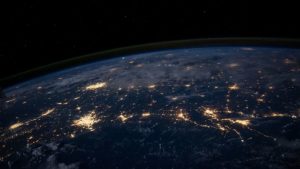As the COP26 Conference draws near, the UK needs to leverage its scientific ability to use satellite data to help countries meet their climate change goals.
A new paper has pointed to the role that Earth Observation (EO) satellite data can play in ensuring nations meet their greenhouse gas emission goals.
Co-authored by Professor Marian Scott from the University of Glasgow’s School of Mathematics and Statistics, ‘The role of space-based Earth observations in achieving climate security’, examined the opportunities and areas for improvement with EO.
The briefing paper identified EO satellites as a critical tool to monitor the causes and effects of climate change. The data they capture will help nations meet their stated goals to lower greenhouse gas emissions and reduce global warming, as brokered in the Paris Agreement.
The technology is also important for informing emergency services of environmental disasters, ranging from floods to landslides, volcanic eruptions, and wildfires.
Released by the COP26 Universities Network, the paper comes ahead of the 2021 COP26 Conference, which will be hosted in Glasgow in November.
Professor Scott said: “Earth observation, when combined with in-situ and sensor data, is extremely powerful, allowing us to observe environmental changes over space and time in unprecedented detail even in remote parts of the globe.
“Archives of historical satellite data are powerful resources when combined with advanced analytics to help us understand what is changing in our natural environment, and how quickly.”
EO refers to global, or near-global, observations of the Earth’s surface and atmosphere by satellites. The near-instantaneous data generated are being used to monitor and assess the pace of climate change and its impacts across the land and seas of the whole planet.
However, translating the vast and increasing volumes of EO data into actionable information poses a technical and societal challenge demanding Big Data infrastructure and expertise, analytics, corresponding visualisations, and international cooperation and coordination.
Despite major progress in satellite technology and data analysis, the robust operational monitoring and analysis systems that can produce quality-assessed EO products in a form that can be used by non-specialists are not always available.
According to the report, there are three key focus areas to ensure EO is fit for purpose and optimised. The first of these is capacity building, with the report noting that the UK’s position as an environmental science leader means it can contribute to developing EO technology.
This should include the expanded provision of education and training in EO science and climate nationally and internationally via, for example, Official Development Assistance (ODA) programmes.
Second, international cooperation and coordination are needed between the space agencies, national funding bodies, Non-Governmental Organisations (NGOs) and entities such as the Group on Earth Observation and United Nations Framework Convention on Climate Change (UNFCCC) to achieve full and appropriate use of EO data and ensure the resources are free to use and tailored to stakeholder needs.
Finally, the report called for a mechanism to fund such cooperation at an international level does not exist, but this will be critical in maximising the full potential of EO data and technology.
However, the university warned that although the UK is at the forefront of developing and harnessing technology to turn EO data into actionable information, more education and training is needed to maximise its potential and help the world to meet challenging climate targets.
Lead author of the briefing Jonathan Bamber, Professor of Physical Geography at the University of Bristol’s School of Geographical Sciences and its Cabot Institute for the Environment, said: “Earth Observation satellites are our eyes on the planet. Without them we would be virtually blind to the magnitude and timing of climate change and to human interference with the fragile ecosystems that we all depend on.”
Source: DIGIT

